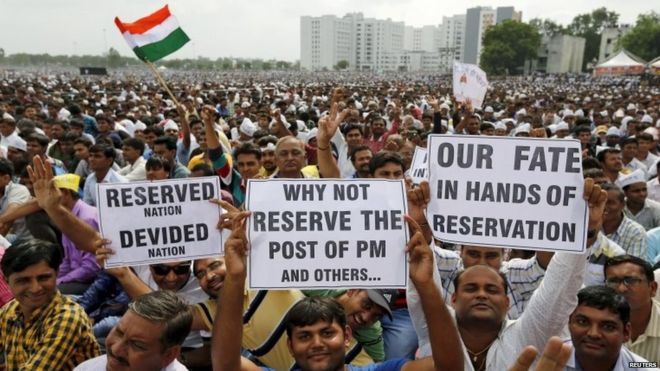India has to be the only country in the world where people stage large-scale protests ending in even larger-scale destruction of public property with the agenda of designating themselves as backward classes. Climbing down the rungs of social hierarchy, surprisingly (or not so surprisingly), seems to be the thing that’s bringing people from different parts of the country together. The Jats, the Patels, and the Kapus – three very diverse sects of people from three very different parts of the country – have shun all differences and are fighting tooth and nail to become part of the same common denominator, the icing on top of the cake and the most sought-after commodity in India today – Reservation.
With a history of caste-based discrimination and seclusion, the Indian Constitution provided for some percentage of ‘seats’ to be reserved for the ‘Depressed Classes’, a figure which stands at 49.5% today. Half the vacancies in any institution in India are reserved.
An even more absurd figure is that of the provision in Maharashtra and Andhra Pradesh – with 52% and 66.6% of all seats being reserved respectively. The question leaps out to the eye: Who is the minority we’re talking about? And what exactly are all these widespread protests about if half the seats on an average are already reserved?
In a survey conducted by the Ministry of Human Resource Development, the representation of all communities availing the benefit of reservation in higher educational institutes is 54.8%. Under-representation is clearly not the issue here. And of those represented under the above 54.8% banner, the average cut-off mark, in the JEE Mains 2015 for example, was 105 for the Open Category, 70 for the OBCs, 50 for the SCs, and 44 for the STs.
If 84 years since the Poona Pact of 1932 was not enough for the backward classes of India to acquire quality education and represent themselves adequately in positions of their choice through reservation, then the entire concept of Reservations in India only serves to neglect the merit of a candidate, and furthers disparities in caste.
The recent Jat agitations or the Rohith Vemula/Kanhaiya incidents that took India by storm, figuratively and also literally by causing serious damage to infrastructure and livelihood, are testament to the fact that Reservation is not the solution to the problem; rather it has effectively drawn the noose tighter around caste-based differences in society. Prolonging the caste-based reservation system indefinitely also serves as a clever construct for politicians to secure easy votes.
Whoever said “In India, you don’t cast your vote, you vote your caste” was spot on. Reservation is a smokescreen effectively maintained to brush aside the real issue of working with people at the grass-root level to change mind sets against caste-based discrimination.
Reservation is contradictory to its own purpose, as it highlights caste rather than combatting it, making us ask who the backward classes of India really are. Reservation in India needs to morph from a caste to an economical basis, something which actually validates its existence. The initiative taken in Gujarat to provide a 10% reservation to the Patels for their economic situation disregarding their ‘upper cast’ status is a ray of hope. After implementing this, steps need to be taken to ensure that income certificates are not faked, which is a very common occurrence today.
In his November 3, 1969 speech, former US President Richard Nixon said, “And so tonight-to you, the great silent majority of my fellow Americans-I ask for your support”, referring to those who had not expressed their views on key issues at the time. India is at such a juncture today, with the silent majority additionally being the ‘minor’ majority created by the reservation system. For every flamboyant protest in favour of Reservation, there is always silent disapproval against it, its voice quelled. It is time to recognise that voice.
It is true that the injustice faced by the backward classes marked a dark period in our history, but Reservation is no longer a viable solution. The backward classes of India, backed by Reservation, are actually ‘backed’-ward.
– Devyani Reddi | 6thformpoet@gmail.com
(Freelance journalist from Hyderabad)
Image Courtesy: http://ichef.bbci.co.uk/news/660/cpsprodpb/29D3/production/_85170701_85170700.jpg
